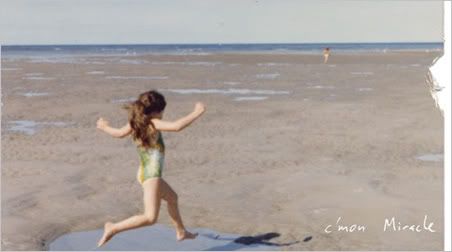A FAVORITE FROM FIVE YEARS AGO

“Jerusalem”
from the album C’mon Miracle
Original release date: May 4, 2004
iTunes
2004:
A much quieter and more thoughtful album than any of her previous releases, Mirah’s C’mon Miracle doesn’t grab the listener by the ears and boldly proclaim its greatness the way that her last album, Advisory Committee, did. Instead of offering the scattershot brilliance of that album or You Think It’s Like This but It’s Really Like This, C’mon Miracle is more focused, more mature, and closer to a traditional singer/songwriter’s work. This doesn’t mean that it’s conventional or boring though — far from it. Even though the subtlety and complexity of songs like “Nobody Has to Stay” and “Promise to Be Kind” show how much her craft has grown over the years, the album still has enough of a K Records feel to keep fans of Mirah’s smart, creative indie pop happy. The wonderfully sympathetic artist-producer relationship between her and Phil Elvrum is a key part of C’mon Miracle, helping to balance the album’s more serious leanings and her more whimsical-sounding earlier work. For the most part, Elvrum’s production is understated and far less busy than that of Advisory Committee. On songs like “Jerusalem” — which was intended for a Hanukkah compilation but rejected because it was too political (it criticizes Israel’s hawkish behavior in the most poetic terms) — he sets Mirah’s voice like a jewel, surrounding it with pretty but unobtrusive arrangements. However, that just means that C’mon Miracle‘s elaborately produced moments stand out even more. “The Light” — which appeared on Mirah’s collaboration with the Black Cat Orchestra, To All We Stretch the Open Arm, with a very different arrangement — gets the deluxe Elvrum treatment: it begins with distant, quasi-industrial percussion and stormy guitars and ends on a surprisingly gentle note. “We’re Both So Sorry” is even more elaborate, using autoharp, brass, double-tracked vocals, fuzzed-out percussion, and guitars to underscore the duality of the song’s breakup lament. These songs, along with “The Struggle” (on which Elvrum is credited with playing the chest), recall Advisory Committee‘s glory, and even though it’s tempting to want all of C’mon Miracle to sound like this, the album does have its own distinctive character, particularly on the tracks inspired by Mirah’s trip to Buenos Aires; “Don’t Die in Me” and especially “The Dogs of B.A.” integrate Latin folk influences into her sound effortlessly. “Look Up,” meanwhile, rocks harder than anything she’s ever done before, and the charming chamber pop of “Exactly Where We’re From” also proves that Mirah hasn’t forsaken the eclectic spirit of her music. An album about war, peace, and longing, C’mon Miracle isn’t as showy as some of her previous outings, but it does show that Mirah’s music works on both a large and small scale.


